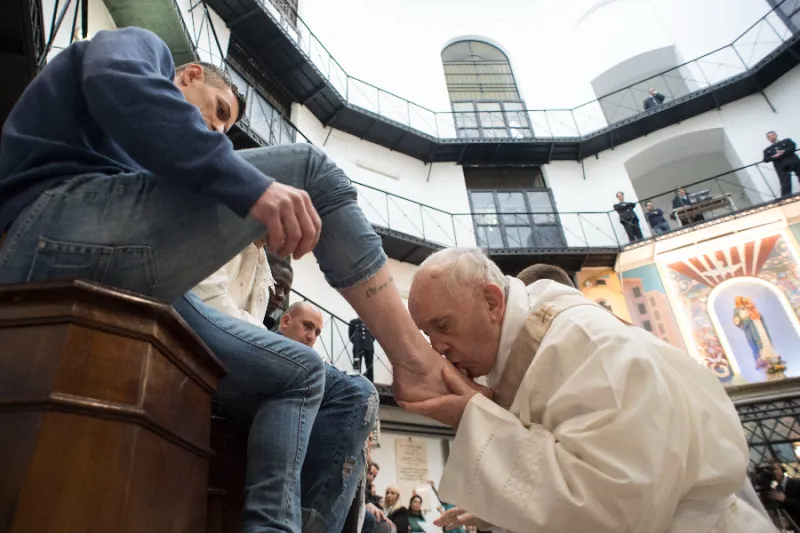
Vatican City, Apr 13, 2022 / 10:15 am (CNA).
On Holy Thursday, Pope Francis will celebrate Mass at a prison outside of Rome, where he will wash the feet of 12 prisoners.
The Mass of the Lord’s Supper will take place at the prison of Civitavecchia, a port town around 50 miles northwest of Rome, according to a press release from an Italian association of prison chaplains.
With the private Mass, Pope Francis continues a custom he started in 2013, shortly after becoming pope, of celebrating the Holy Thursday liturgy in a prison or juvenile detention center.
Father Raffaele Grimaldi, a representative of Italy’s prison chaplains, said: “We are grateful to the Holy Father for having chosen, once again, an existential periphery, a place of proximity, to send the world a message of closeness and hope.”
“To wash the feet of 12 prisoners, bending himself before their poverty and their weaknesses, to wash the feet of those who have walked streets of violence, trampling on the rights of the innocent, for us prison workers signifies a humble, incomprehensible, and shocking gesture, which Jesus the Good Shepherd has entrusted to humanity,” the chaplain said.
The Civitavecchia prison has around 500 inmates.
If you value the news and views Catholic World Report provides, please consider donating to support our efforts. Your contribution will help us continue to make CWR available to all readers worldwide for free, without a subscription. Thank you for your generosity!
Click here for more information on donating to CWR. Click here to sign up for our newsletter.




How about 12 Priests!!!
Good question! Why would a pope not wash the feet of priests? Some ideas:
1) Washing the feet of priests conveys respect or dignity for priests?
2) Washing the feet of prisoners demonstrates humility?
3) Washing the feet of prisoners reveals one’s degradation?
4) All the above.
5) None of the above.
Will Francis first wash himself?
Jesus answered, “Unless I wash you, you have no part with Me.” “Then, Lord,” Simon Peter replied, “not only my feet, but my hands and my head as well!” Jesus told him, “Whoever has already bathed needs only to wash his feet, and he will be completely clean. And you are clean, though not all of you.” (John 13:9)
Why dirty twelve towels?
If he did, he would probably choose dissenting priests.
And this is significant or meaningful because….?